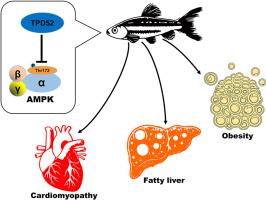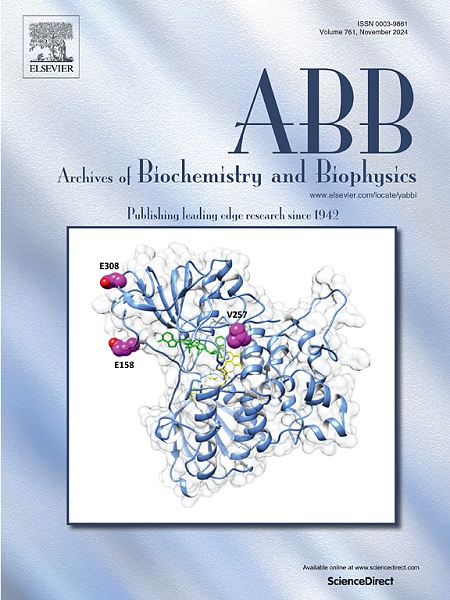Heightened TPD52 linked to metabolic dysfunction and associated abnormalities in zebrafish
IF 3.8
3区 生物学
Q2 BIOCHEMISTRY & MOLECULAR BIOLOGY
引用次数: 0
Abstract
The tumor protein D52 (TPD52) gene encodes a proto-oncogene protein associated with various medical conditions, including breast and prostate cancers. It plays a role in multiple biological pathways such as cell growth, differentiation, and apoptosis. The function of TPD52 in lipid droplet biosynthesis has been investigated in vitro. However, its precise role in lipid metabolism in animal models is not fully understood. To investigate the functions of TPD52 in vivo, we performed a conditional TPD52 protein expression analysis using a Tet-off transgenic system to establish conditionally expressed Tpd52 transgenic zebrafish. The effect of Tpd52 on lipogenesis was assessed using various methods, including whole-mount Oil Red O staining, histological examination, and measurement of inflammatory markers and potential targets using real-time quantitative polymerase chain reaction and immunoblotting in Tpd52 fish. Zebrafish with increased Tpd52 levels exhibited notable weight gain and the enlargement of fat deposits, which were mainly attributed to an increase in the volume of adipocytes. Moreover, Tpd52 overexpression was correlated with the triggering of the adipocyte differentiation signaling pathway. During adipocytic differentiation in response to nutrient status, our observations revealed adipogenesis, nonalcoholic fatty liver disease, and metabolic cardiomyopathy (MCM) in Tpd52 transgenic zebrafish. To gain a deeper understanding of the contribution of these proteins to the regulation of cellular growth, we investigated the expression of their corresponding genes and proteins in zebrafish. In the present study, the activated protein kinase pathway was identified as the primary target of TPD52. Adult Tpd52 zebrafish showed increased lipid accumulation, resulting in the development of visceral obesity, nonalcoholic fatty liver disease, and MCM. These findings strongly suggest that TPD52 actively contributes to adipose tissue expansion and its subsequent effects. This investigation provides compelling evidence that Tpd52 facilitates adipocyte development and related metabolic comorbidities in zebrafish.

TPD52 增高与斑马鱼代谢功能障碍及相关异常有关。
肿瘤蛋白 D52(TPD52)基因编码一种与乳腺癌和前列腺癌等多种疾病相关的原癌基因蛋白。它在细胞生长、分化和凋亡等多种生物通路中发挥作用。TPD52 在脂滴生物合成中的功能已在体外进行了研究。然而,它在动物模型脂质代谢中的确切作用还不完全清楚。为了研究 TPD52 在体内的功能,我们利用 Tet-off 转基因系统进行了条件 TPD52 蛋白表达分析,建立了条件表达 Tpd52 的转基因斑马鱼。我们使用多种方法评估了 Tpd52 对脂肪生成的影响,包括整只斑马鱼油红 O 染色、组织学检查,以及使用实时定量聚合酶链式反应和免疫印迹法测定 Tpd52 斑马鱼的炎症标志物和潜在靶标。Tpd52水平升高的斑马鱼表现出明显的体重增加和脂肪沉积增大,这主要归因于脂肪细胞体积的增加。此外,Tpd52的过表达与脂肪细胞分化信号通路的触发有关。在脂肪细胞随营养状况分化的过程中,我们观察到 Tpd52 转基因斑马鱼出现了脂肪生成、非酒精性脂肪肝和代谢性心肌病(MCM)。为了更深入地了解这些蛋白对细胞生长调控的贡献,我们研究了其相应基因和蛋白在斑马鱼体内的表达。在本研究中,活化蛋白激酶通路被确定为 TPD52 的主要靶标。成年 Tpd52 斑马鱼的脂质积累增加,导致内脏肥胖、非酒精性脂肪肝和 MCM 的发生。这些发现有力地表明,TPD52 积极促进了脂肪组织的扩张及其后续影响。这项研究提供了令人信服的证据,证明 Tpd52 促进了斑马鱼脂肪细胞的发育和相关代谢综合症的发生。
本文章由计算机程序翻译,如有差异,请以英文原文为准。
求助全文
约1分钟内获得全文
求助全文
来源期刊

Archives of biochemistry and biophysics
生物-生化与分子生物学
CiteScore
7.40
自引率
0.00%
发文量
245
审稿时长
26 days
期刊介绍:
Archives of Biochemistry and Biophysics publishes quality original articles and reviews in the developing areas of biochemistry and biophysics.
Research Areas Include:
• Enzyme and protein structure, function, regulation. Folding, turnover, and post-translational processing
• Biological oxidations, free radical reactions, redox signaling, oxygenases, P450 reactions
• Signal transduction, receptors, membrane transport, intracellular signals. Cellular and integrated metabolism.
 求助内容:
求助内容: 应助结果提醒方式:
应助结果提醒方式:


